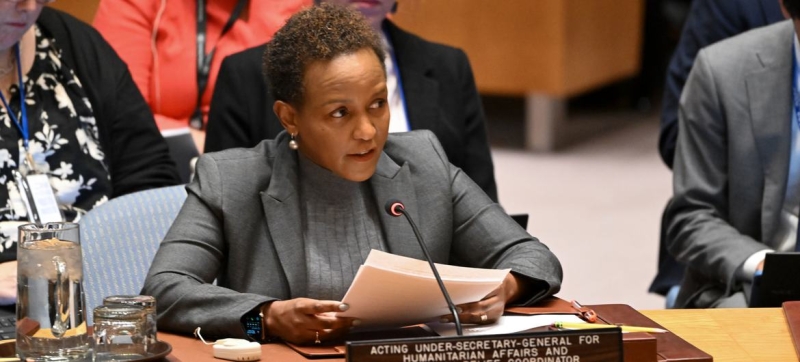
Acting Under-Secretary-General for Humanitarian Affairs and Emergency Relief Coordinator Joyce Msuya. Security Council Briefing: Food Aid Stocks in Northern Gaza to Run Out Soon Humanitarian Aid
In just one week, nearly 400 Palestinians have been killed in Gaza, with 1,500 injured. Dozens of people have no access to medical care. This was announced at a briefing in the Security Council by Acting Under-Secretary-General for Humanitarian Affairs and Emergency Relief Coordinator Joyce Msuya.
She, in particular, recalled the strikes on the school in Nuseirat and on the territory of the hospital in Deir el-Balah, where tents in which people were sleeping caught fire.
Israel has also intensified its military offensive in the north of the sector, she noted. “There continue to be reports of heavy fighting in and around Jabaliya, which is under siege, and indiscriminate rocket fire into Israel by Palestinian armed groups,” the UN deputy chief said.
The UN Office for Humanitarian Affairs (OCHA) estimates that more than 55,000 people have fled Jabaliya since early October, while others remain in their homes and are in dire straits, lacking water and food.
“Yesterday, 13 members of a family were killed as rescuers were again unable to reach the wounded trapped under the rubble,” Msuya said.
Only three hospitals in the north are functioning
Only three of 10 hospitals in northern Gaza are currently functioning, and only at minimum capacity. Health facilities are short of fuel, medicine and blood for transfusions, and women are giving birth under bombardment, Msuya said.
“For the 155,000 pregnant and breastfeeding women in Gaza, this is a gruelling and traumatic experience. They do not know where or how to give birth, or whether their baby will survive. There is no antenatal care. There is no medicine, but there is hunger. About 11,000 pregnant women are suffering from hunger and malnutrition, which is putting not only their lives at risk, but also the lives of their newborn children,” said the acting emergency relief coordinator.
On October 12, a team consisting of representatives of the UN and the Palestine Red Crescent Society was able to reach Kamal Adwan and Al-Sahaba hospitals in northern Gaza after nine attempts, after Israeli forces had previously restricted access to the hospitals.
“The team eventually transferred more than a dozen patients in critical condition from Kamal Adwan to Al-Shifa Hospital. Other patients and their companions, who had previously been transferred to Kamal Adwan from Al-Awda Hospital, were also transferred to Al-Shifa,” Msuya said.
The team also delivered fuel and blood for transfusions to the hospitals. All of these operations were carried out amid intense fighting.
“The UN and Palestine Red Crescent Society drivers were subjected to humiliating treatment during the search and temporary detention at the checkpoint. Medical staff kept one child alive manually with oxygen for more than seven hours until they passed through the checkpoint,” Msuya said.
Lack of humanitarian aid
No food aid was delivered to northern Gaza from October 2 to 15. Only small deliveries are now being allowed and all food supplies needed for survival are running out, the Acting Emergency Relief Coordinator said.
In Gaza City, more than 110,000 meals are being distributed daily by at least 10 kitchens, including to people displaced from the north.
Between 11 and 13 October, humanitarian organisations distributed more than 1,500 food parcels and 1,500 bags of wheat flour to displaced people in the northern Gaza Strip.
“However, there is currently almost no food left to distribute and most bakeries will be forced to close again in the next few days without additional fuel,” Msuya said.
During the first two weeks of October, only one of 54 coordinated missions to the north through the al-Rashid crossing was carried out with the assistance of the Israeli authorities. Most of the missions were rejected, while the rest were hampered or cancelled due to security or logistical issues.
“Every time the mission faces obstacles, the lives of people in need and humanitarian workers on the ground are further put at risk. This is a sad and unacceptable trend that must change,” said the Acting Emergency Relief Coordinator.
Second round of polio vaccination campaign
Msuya also recalled that the second round of the polio vaccination campaign has begun in central Gaza. On 14 and 15 October, nearly 157,000 children under the age of 10 were vaccinated.
“The campaign once again highlighted the critical role of UNRWA (the United Nations Relief and Works Agency for Palestine), whose teams vaccinated 43 per cent of children on the first day,” Msuya said.
She stressed that the parties must continue to respect the agreed humanitarian pauses and that access must be granted to humanitarian workers throughout Gaza, including in the north.
The Path to Peace
Msuya also recalled the need to protect civilians and provide them with humanitarian and medical assistance. She called for facilitating humanitarian operations in Gaza, releasing the hostages and allowing the International Committee of the Red Cross to visit them until they are released.
“We once again call on the international community to make urgent diplomatic efforts to de-escalate the situation, ensure respect for international law, achieve an immediate ceasefire in Gaza and agree on a path to sustainable peace,” Msuya said.
